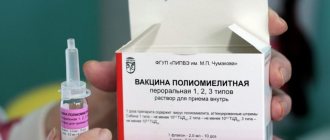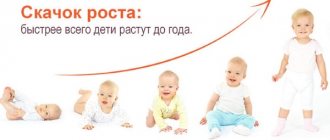What infections are children vaccinated against under one year of age?
After birth, a baby is exposed to bacteria and viruses that can enter the body through breathing, eating, experiencing the world around us, and even at the time of birth.
Some pathogens can cause severe illness with a high risk of disability and death. Therefore, already in the first year of life in most countries of the world, children receive protection from dangerous infections with the help of vaccines. In Russia, according to the National Calendar of Preventive Vaccinations, in the first year of life a child receives vaccines against the following infections:
- Hepatitis B. This is a viral disease that affects the liver. In children under one year of age, hepatitis B becomes chronic in 80–90% of cases and subsequently leads to liver cirrhosis and cancer. Transmission of the virus to a child is possible through the placenta and during childbirth through blood, as well as through breast milk, damage to the skin and mucous membranes, medical interventions, and blood transfusions. Opponents of vaccination may argue that this vaccination is not necessary for children under one year of age, because most pregnant women are screened for hepatitis B and if the mother is not infected, transmission of the virus to the newborn is impossible. In fact, an expectant mother can become infected with hepatitis B shortly before giving birth (for example, through sexual contact, after visiting a dentist or gynecologist). Newborns are vaccinated against hepatitis B on the first day after birth, then at 1 and 6 months. Vaccination is carried out intramuscularly in the upper third of the thigh. Children at risk for hepatitis are vaccinated 4 times, the last time a year.
- Tuberculosis. This infection continues to be one of the top 10 causes of death in the world. The number of multidrug-resistant forms increases every year. The first prevention of tuberculosis is carried out in the maternity hospital on the 3rd–5th day of life with the BCG vaccine (from the first Latin letters of the name of the Calmette-Guerin bacillus), revaccination at 6-7 years. BCG does not provide 100% protection against future tubercle bacilli infection, but it significantly reduces the risk of severe forms of the disease. The vaccination is carried out intradermally, between the upper and middle thirds of the left shoulder.
- Polio. The cause of the disease is an enterovirus, which can infect motor neurons of the spinal cord and brain with subsequent paralysis of the limbs. If the muscles involved in breathing and swallowing are affected, death can occur. Vaccination is carried out three times: at 3 months, 4.5 and 6 months. The first two immunizations are performed with inactivated vaccine (IPV), and the third with oral polio vaccine (OPV), which contains live strains of the virus. If parents wish, OPV can be replaced with IPV. Revaccination against polio includes three doses of OPV: at 18, 20 months and at 14 years.
Important! The oral polio vaccine contains weakened live polio viruses. In very rare cases (3–4 cases per 1 million children vaccinated for the first time), these viruses cause vaccine-associated poliomyelitis. This occurs when the oral vaccine is given to children as the first dose. Parents whose children are not vaccinated at all should also be more careful. If such babies come into contact with children who have received the oral vaccine, the weakened virus can be transmitted to them and cause illness. Although this happens extremely rarely, it is better to isolate unvaccinated children from vaccinated children for at least 90 days after the latter receive the live vaccine.
4. Whooping cough is a bacterial infection with airborne transmission. Its main symptom is a prolonged paroxysmal cough with a “reprise”: wheezing inhalation. Whooping cough is especially unfavorable in children in the first three years of life. Cough with whooping cough is often debilitating, including vomiting, cerebral hemorrhages, and temporary respiratory arrest (apnea). Complications of whooping cough in the form of bronchitis, pneumonia, and convulsions are common. Vaccination against whooping cough makes it possible to prevent the development of the disease or prevent its severe course. The vaccination is carried out three times from the age of three months with an interval of 1.5 months (re-vaccination - at 18 months). In this case, a combined vaccine is used - DTP, which forms in the infant immunity not only to whooping cough, but also to diphtheria and tetanus. DTP includes whole killed whooping cough cells, and therefore is not always easily tolerated. An alternative to DPT is acellular vaccines: Infanrix, Infanrix Hexa, Pentaxim and Tetraxim.
5. Diphtheria is an infection that is dangerous due to the effects of diphtheria toxin on the nervous tissue and heart muscle. It can cause paralysis of swallowing, respiratory muscles, damage to the heart muscle with the occurrence of heart failure and death. The source of diphtheria toxin is dense bacterial films on the mucous membranes of the upper respiratory tract. Diphtheria films contribute to the development of edema and narrowing of the lumen of the larynx, followed by suffocation - “true croup”. To protect against diphtheria, adsorbed pertussis-diphtheria-tetanus vaccine (DTP) is used. If a child has a contraindication to DTP, he can be vaccinated separately with diphtheria toxoid. Revaccination is carried out at 18 months, 6–7 and 14 years, then diphtheria is vaccinated every 10 years.
6. Tetanus is an infection caused by the tetanus bacillus (clostridia). Tetanospasmin, a neurotoxin of the pathogen, is deadly. It causes muscle spasm until breathing stops. Infection occurs when wounds, burns, or foreign objects enter the body. The vaccination is carried out with a combined vaccine, which helps protect the body from three infections at once: whooping cough, diphtheria and tetanus (DTP). If it is not possible to get the DPT vaccine, you can get tetanus toxoid separately. Revaccination is carried out at 18 months, 6-7 and 14 years, then tetanus is vaccinated every 10 years.
7. Haemophilus influenzae infection (Hib infection). Caused by Haemophilus influenzae ("influenza bacillus") with airborne transmission. It causes purulent diseases of the ENT organs and respiratory system, nervous system (meningitis), subcutaneous tissue; when the infection generalizes, sepsis is possible. Vaccination against Hib infection is recommended only for children at risk, which includes children with immunodeficiency conditions. Children under one year old are vaccinated three times: at 3, 4.5 and 6 months. Revaccination - at 18 months.
8. Pneumococcal infection. The most common bacterial acute respiratory infection in children, in 80% of cases it is the etiological factor of pneumonia. Young children are most vulnerable to pneumococci, so vaccination begins at two months: two doses of the vaccine at 2 and 4.5 months, revaccination at 15 months.
9. Measles, rubella, mumps (“mumps”). Vaccination against these viral infections is usually carried out at 12 months (booster vaccination at 6 years). Measles (“childhood plague”) carries the highest risk of complications (blindness, encephalitis, pneumonia) with the possibility of death. Combination drugs “Priorix” and “MMP-II”, containing proteins from three viruses, have been registered in Russia. It is possible to use monocomponent vaccines against measles and rubella (Rudivax, Ervevax), as well as two-component vaccines against mumps and measles.
10. Flu. It has an unpredictable prognosis for children under 5 years of age, as they are susceptible to complications and a severe course of the disease. Vaccination of children against influenza is possible from 6 months of age.
Vaccination before and during pregnancy
Through the placenta of the expectant mother, immunoglobulins enter the child’s body, which protect the baby from certain infections for a certain period of time.
This is not the case with whooping cough, as the mother's antibody levels are not sufficient to protect the newborn, and the baby is susceptible to this infection before the age of three months. Therefore, in some countries (England, Australia, USA, Belgium, Israel) pregnant women are vaccinated with pertussis vaccine in the third trimester. There is no such practice in Russia yet. When planning a pregnancy, a woman must be 100% sure that she will not get rubella and measles, which can lead to miscarriage or cause serious abnormalities in the development of the fetus. To avoid troubles, it is advisable for such women to be examined for antibodies to rubella and measles, and, if necessary, be vaccinated before pregnancy.
ADSM before school
For children, the ADSM vaccination at 7 years of age is prescribed in accordance with the National Vaccination Calendar to protect against tetanus and diphtheria.
The name can be deciphered as follows:
- A - adsorbed;
- D - diphtheria;
- C - tetanus;
- M - small dose of diphtheria component.
This vaccine is well tolerated by children. Another advantage is that all components enter the body after one injection.
The DTP vaccine is usually not given at 7 years of age, because it is replaced by ADSM.
Vaccination calendar for children under one year old
The vaccination calendar for children under one year of age is the period approved by the Russian Ministry of Health for mandatory vaccines (Table 1).
Table 1. Vaccination schedule for children under 1 year of age, according to the National Preventive Vaccination Calendar.
| Infection | Child's age | ||||||||
| First 24 hours | 3–5 days | 1 month | 2 months | 3 months | 4.5 months | 6 months | 9 months | 12 months | |
| Viral hepatitis B | B1 | B2 | B3 | ||||||
| B1 | B2 | B3 | B4 | ||||||
| Tuberculosis | B | ||||||||
| Whooping cough | B1* | B2* | B3* | ||||||
| Diphtheria | |||||||||
| Tetanus | |||||||||
| Polio | B1* IPV | B2*IPV | B3*IPV | ||||||
| Haemophilus influenzae infection | B1* | B2* | B3* | ||||||
| Measles | B1* | ||||||||
| Rubella | |||||||||
| Parotitis | |||||||||
| Pneumococcal infection | B1 | B2 | |||||||
| Flu | B | ||||||||
Legend:
- B1, B2, B3, B4, — serial number of vaccination;
- B - all children of this age group;
- B - children from risk groups, according to indications;
- * - mainly as part of combined vaccines;
- IPV—inactivated polio vaccine;
- OPV - oral polio vaccine.
In a number of countries, the national calendar for children under one year of age includes vaccinations against rotavirus infection and meningococcus, and after one year - against chickenpox, hepatitis A, tick-borne encephalitis, and HPV (human papillomavirus). In Russia, these infections are not yet subject to mandatory immunoprophylaxis, although the Union of Pediatricians of Russia recommends them.
The national vaccination calendar for up to a year includes the minimum number of vaccinations required to protect against dangerous infections. If children have certain conditions and parents wish, additional vaccinations may be given.
Vaccinations before school
What vaccination is given at 7 years of age?
At six to seven years of age, revaccination against the following diseases is necessary:
- from measles, rubella, mumps;
- from diphtheria, tetanus.
If parents want to carry out a larger number of vaccinations to maximum protect their child from infections, then they need to consult with their pediatrician. Your doctor may suggest vaccinations against chickenpox, pneumococcal disease, influenza, and hepatitis A.
Also, in those regions where there is a high risk of encountering a tick bite infected with viral encephalitis in the warm season, it is strongly recommended to vaccinate children against it before the onset of spring.
Changing the vaccination schedule
There are situations when vaccinations cannot be done due to contraindications, pandemics, quarantine measures, or travel. As a rule, they are temporary. In this case, you need to go to a doctor who will help you create an individual vaccination schedule. In Russia, for now, each pediatrician adjusts catch-up vaccination schedules based on their own experience and each specific situation (how many vaccinations the child has already received, how many more they need). However, in 2020, the first document appeared in our country, developed by the Federal Medical and Biological Agency (FMBA of Russia) and including recommendations for catch-up immunization of children.
Is it necessary to get vaccinated?
Many parents unreasonably refuse to vaccinate their children for various reasons. These are religious beliefs, the presence of complications after vaccinations, false medical guidelines, the opinion that vaccination is inappropriate, conspiracy theories (“vaccinations are needed for the profit of pharmaceutical companies”) and others.
However, in addition to protecting individual children from serious and deadly infections, vaccines are needed to protect society as a whole from disease. If the majority of mothers and fathers refuse the necessary vaccinations for their babies, collective immunity, which is needed to curb the development of epidemics, will not be formed in the children's team and in society (Fig. 1). For example, in 2017, due to insufficient measles vaccination coverage, WHO estimates that there were 110,000 deaths related to the disease worldwide.
Figure 1. How collective or herd immunity works. Source: MedPortal
Some European countries and the United States have introduced penalties for parents who unreasonably refuse to vaccinate their children. There is also a practice of preventing unvaccinated children from joining organized groups, which is enshrined in law. In Russia, such strict measures are not provided. Vaccination is carried out at the request of parents and with their consent. However, if there is a threat of an outbreak of infection, unvaccinated children may be temporarily not allowed to attend kindergarten or school (according to the Federal Law “On Immunoprevention of Infectious Diseases”).
Vaccinations before kindergarten
In kindergarten, a child is in contact with a significant number of other children. It has been proven that it is in children's environments that viruses and bacterial infections spread at maximum speed.
To prevent the spread of dangerous diseases, it is necessary to complete vaccinations according to age and provide documentary evidence of vaccinations.
In addition to the mandatory vaccinations, it is recommended to perform additional:
- Flu vaccination. Performed annually, it significantly reduces the likelihood of contracting the flu in the autumn-winter period.
- Vaccination against pneumococcal infection. Performed once, the vaccination must be completed at least a month before visiting a child care facility.
- Vaccination against viral meningitis. Performed from 18 months.
- Vaccination against hemophilus influenzae infection. From 18 months, with weakened immunity, vaccination is possible from 6 months.
The vaccination schedule for children is usually developed by an infectious disease specialist. In good children's vaccination centers, it is mandatory to examine children on the day of vaccination to identify contraindications. It is undesirable to vaccinate at elevated temperatures and exacerbation of chronic diseases, diathesis, herpes
Vaccination in paid centers does not reduce some of the pain associated with the administration of adsorbed vaccines, but you can choose more complete kits that provide protection against more diseases in 1 injection. The choice of combination vaccines provides maximum protection with minimal injury. This applies to vaccines such as Pentaxim, DTP and the like. In public clinics, such a choice is often impossible due to the high cost of polyvalent vaccines.
Preparing your baby for vaccinations
Vaccination of children under one year of age is carried out in a medical institution by specially trained personnel. Before vaccination, an objective examination by a doctor with temperature measurement is required. The doctor will evaluate the condition of the skin, pharynx, lymph nodes, respiratory and cardiovascular systems, and abdominal organs. Anamnesis data on the presence of reactions to previous vaccinations, allergies, and past infections are also important.
2-3 days before the planned vaccination, parents should not introduce new complementary foods to the child’s food, they should avoid taking common food allergens (citrus fruits, honey, strawberries), if possible, avoid visiting crowded places of children and adults, and avoid hypothermia or overheating of the baby.
Often, not only parents, but also doctors do not allow children with prematurity and a history of allergies, mild anemia, pathology of the nervous system, congenital defects, neonatal jaundice, or enlarged thymus to receive vaccinations. These conditions are not considered contraindications for vaccination and are false exemptions. Moreover, children from these groups may be more susceptible to infections and at risk of severe illness.
Why do you need to have mandatory vaccinations based on age?
An unvaccinated child who is constantly among vaccinated children most likely will not get sick precisely because of herd immunity. The virus simply does not have enough carriers to spread and further epidemiological infection. But is it really ethical to use the immunity of other children to protect your own child? Yes, your child will not be pricked with a medical needle, he will not experience discomfort after vaccination, fever, weakness, and will not whine and cry, unlike other children after vaccination. But when in contact with unvaccinated children, for example, from countries without mandatory vaccination, it is the unvaccinated child who is at maximum risk and may get sick.
The immune system does not become stronger by developing “naturally” and infant mortality rates are clear confirmation of this fact. Modern medicine cannot counteract viruses with absolutely nothing except prevention and vaccinations, which build the body’s resistance to infection and disease. Only the symptoms and consequences of viral diseases are treated.
In general, only vaccination is effective against viruses. Keep up with your age-appropriate vaccinations to keep your family healthy. Vaccination of adults is also desirable, especially with an active lifestyle and contact with people.
Contraindications to vaccinations in children
Temporary contraindications are acute diseases and conditions that require a delay in vaccination. Temporary contraindications for vaccination may include:
- acute respiratory infections;
- widespread allergic rash or manifestations of atopic dermatitis during an exacerbation;
- signs of intrauterine infection;
- birth trauma with neurological symptoms;
- intestinal infection;
- moderate or severe hemolytic disease of newborns (in the form of jaundice and edematous syndrome).
Absolute contraindications to certain immunoprophylaxis drugs are severe reactions or complications to previous administrations of the same vaccines. These include:
- an increase in temperature of more than 40°C and redness at the injection site with an area of more than 8 cm;
- anaphylactic shock and severe allergic conditions (Quincke's edema, generalized rash with blisters);
- the appearance of seizures and signs of damage to the nervous system after a previous similar vaccination;
- damage to the skin and subcutaneous tissue, enlarged lymph nodes and the formation of keloid scars more than 10 mm in diameter during BCG vaccination.
Immunodeficiency conditions are relative contraindications for vaccination. In each specific case, only an experienced pediatrician can decide on the need for specific prevention of a particular infection.
Children born to HIV-positive mothers are vaccinated with live vaccines (BCG, OPV) after the diagnosis of HIV infection has been excluded.
To obtain BCG, temporary medical outlets are:
- prematurity with birth weight less than 2000 g;
- immunodeficiency conditions in a child;
- the presence of generalized tuberculosis infection in other children in the family.
Individual contraindications for vaccinations against measles, rubella and mumps are severe allergies to aminoglycosides and egg whites, which are part of these vaccines. Immunoprophylaxis for influenza in case of egg white intolerance is also not indicated.
The administration of immunoglobulins and blood products for therapeutic purposes, surgery shortly before vaccination is also a reason to postpone vaccination.
Important! To avoid false medical advice, you can independently read the contraindications for vaccination on the Rospotrebnadzor website.
Preventive vaccination calendar
In order to create immunity from certain diseases, it is necessary to undergo a course of preventive vaccinations, which include 2-3 injections and further revaccination:
- The very first vaccination is given to a newborn 12 hours after birth; this will protect the baby from hepatitis B.
- On days 3-7, the child is vaccinated against tuberculosis with the BCG vaccine.
- Revaccination against hepatitis B is prescribed 30 days after the birth of the baby.
- At three months they are vaccinated against: whooping cough, diphtheria, tetanus (one vaccine), polio.
- At 4.5 months the previous vaccination is repeated.
- At 6 months they do the same thing again and add another hepatitis B vaccine.
- At one year of age, a child must be vaccinated against: measles, rubella and mumps (mumps). Everything is done with one injection.
- At 1.5 years of age, revaccination is given against whooping cough, diphtheria, tetanus and polio.
- At 20 months, another booster vaccination. This will also serve as protection against polio.
- Then parents can forget about vaccinations until age 6. At this age, the child is given the vaccine against measles, rubella and mumps.
What vaccinations does a child get at 7 years old?
- First of all, this is BCG revaccination.
- ADSM vaccination is also given to children at 7 years of age.









